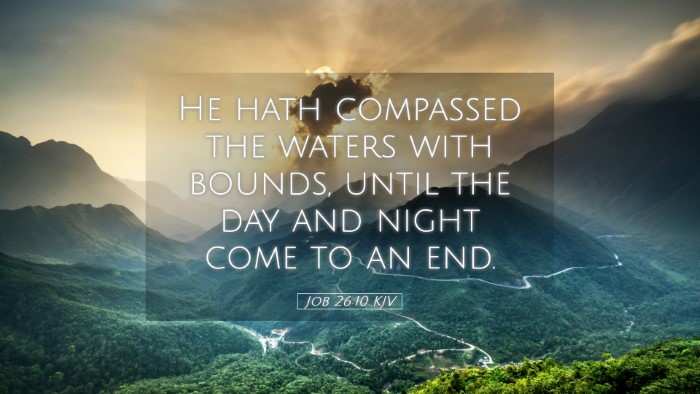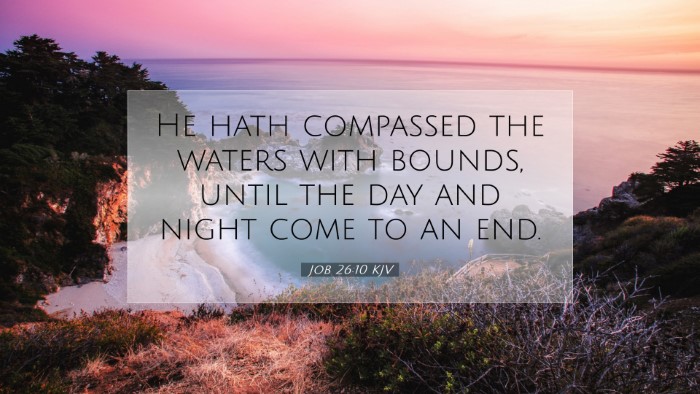Old Testament
Genesis Exodus Leviticus Numbers Deuteronomy Joshua Judges Ruth 1 Samuel 2 Samuel 1 Kings 2 Kings 1 Chronicles 2 Chronicles Ezra Nehemiah Esther Job Psalms Proverbs Ecclesiastes Song of Solomon Isaiah Jeremiah Lamentations Ezekiel Daniel Hosea Joel Amos Obadiah Jonah Micah Nahum Habakkuk Zephaniah Haggai Zechariah MalachiJob 26:10
Job 26:10 KJV
He hath compassed the waters with bounds, until the day and night come to an end.
Job 26:10 Bible Commentary
Commentary on Job 26:10
Verse: "He hath compassed the waters with bounds, until the day and night come to an end."
Introduction
The Book of Job is a profound exploration of human suffering, divine justice, and the relationship between God and humanity. In Job 26:10, we find a significant declaration about God's sovereignty and His mastery over creation. This commentary aims to delve into the depths of this verse, utilizing insights from public domain commentaries, to provide a comprehensive understanding for pastors, students, theologians, and Bible scholars.
Exegesis of Job 26:10
In this verse, Job strikes a major theme of God's control over the natural order. The phrase "He hath compassed the waters with bounds" communicates a critical theological assertion: that God has set limits to the chaotic waters, symbolizing both the literal seas and the broader chaos of the universe.
Interpretative Insights
- Matthew Henry: Henry emphasizes God's omnipotence in creating boundaries and order amidst chaos. The imagery of compassing the waters suggests a divine architect who meticulously governs creation, instilling boundaries to maintain relational integrity within the cosmos.
- Albert Barnes: Barnes notes that God's delineation of boundaries reflects His authority over both the physical and metaphysical realms. He explains that the phrase "until the day and night come to an end" serves as a reminder of the temporality of earthly conditions and the eternal nature of God’s commandments.
- Adam Clarke: Clarke reflects on the significance of boundaries, suggesting they are essential for stability in the created order. He posits that the limits God sets on creation ensure the ongoing cycle of day and night, serving as a testament to His unchanging nature.
Theological Implications
This verse possesses deep theological implications regarding God's sovereignty, control, and the nature of creation.
- The Sovereignty of God: As Job highlights God's supremacy over the waters, this reaffirms God’s reigning power over all creation. Roman Catholic theologians and Protestant reformers alike would view this as an essential component of soteriology and ecclesiology.
- The Order of Creation: The establishment of boundaries indicates a divine order that counters chaos. This idea is pivotal within the doctrines related to creation, especially in the context of Genesis 1, where God brings forth order from chaos.
- The Temporal vs. Eternal: The distinction between the temporal nature of day and night and the eternal nature of God underlines the temporariness of human suffering in the light of divine eternity.
Practical Applications
Understanding Job 26:10 can provide comfort and insight to believers facing trials. The immense assurance that God has control over chaotic waters can foster faith amidst turmoil.
- Comfort in Chaos: Like Job, individuals may find reassurance in knowing that God has established limits on turmoil and suffering.
- Faith in God’s Control: This verse encourages believers to trust in God's sovereignty, especially when life circumstances appear overwhelming.
- Reflection on Creation: The boundaries of creation serve as a poignant reminder of God's ongoing work and His desire for order, which can lead to worship and gratitude for His providence.
Conclusion
Job 26:10 stands as a rich testimony of God's sovereignty and authority over creation. Through insights drawn from the timeless perspectives of Matthew Henry, Albert Barnes, and Adam Clarke, we discover the profound depths of divine control amid chaos. For pastors, students, and scholars, this verse is not merely a statement of fact; it challenges and comforts the heart, inviting believers into deeper trust in the Almighty.


